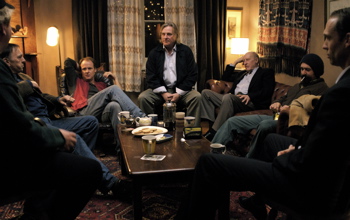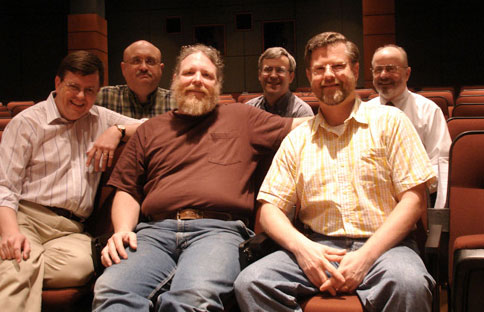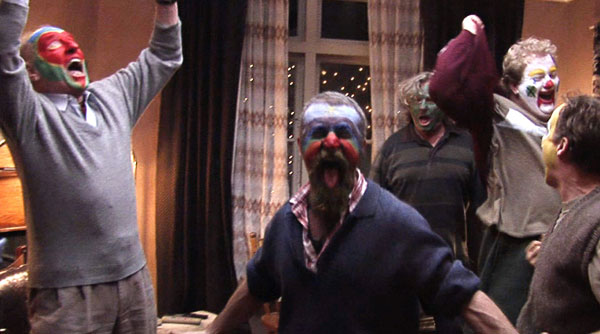Men's Group
WINNER OF BEST FILM, BEST SCRIPT, BEST ACTOR IF AWARDS 2008

Rated MA
Diverse Australian men come to terms with their issues at a self-help meeting...
FILM FIX: THE MAKING OF MEN'S GROUP
Kylie Boltin gets the inside story on the making of Men's Group, in an interview with the film's producer and co-writer, John L. Simpson, 10th November 2008
The independently produced Men's Group is a tough film — a painfully real insight into six men’s lives; strangers who meet once a week to simply, talk.
With moving performances by an ensemble cast, including Grant Dodwell, Don Reid, Paul Gleeson and Steve Rodgers, Men’s Group has been nominated for Best Film, Best Script, Best Music, and Best Actor (Grant Dodwell) at the 2008 Inside Film (IF) Awards – the people’s choice awards for Australian films - and writer, producer and distributor, John L. Simpson has been awarded the AFI Fellowship 2008.
KB: It’s been a busy time for you since your success with the distribution of The Jammed. You co-wrote and produced Men’s Group — the debut feature film, from director, Michael Joy. The use of metaphor and traditional scripting techniques are ongoing throughout the film’s arc as well as a clear sense of research into the area of group psychology. Tell me about the process of co-writing.
JLS: It was a very intuitive and collaborative process. Michael and I gathered stories and did research together with Men's group facilitators, psychologists and councillors. Michael worked with each of the actors, work-shopping in isolation over two months; developing their characters from birth till the day they join the Men's Group. He would then record this and make notes and the two of us would draw out key character points and events that we would hone into scenes.We then crafted a comprehensive script that was only given to the heads of departments. The actors were not allowed to see the script, as we wanted to capture their first responses to their lives as they unfolded in real time as the cameras were rolling.
KB: How did you and Michael Joy work with the actors to approach the material to achieve both the understated and emotive individual performances on the shoot?
JLS: Michael is a very intuitive director; he has the ability to elicit trust from actors. He would spend up to 45 minutes briefing each actor in private prior to shooting, whispering in their ear what they could reveal in each session. As the actors knew nothing of the other characters, every utterance was a fresh revelation.
KB: The film was made with an incredibly small budget, in fact you are calling it a ‘no budget film’. What did you accentuate and what did you lose to make the film in this way?
JLS: The film was created on a reverse finance model, with each key crew member and actor taking an equity position in the film. Put simply, if the film does well, everyone benefits; if it does not, they have had a unique experience and they have invested their time. As far as what we lost, nothing in fact, we wanted to make the film this way and we ended up with everything you would normally have on a low budget film of approximately $1 million dollars (catering included).What we gained was great freedom as we were able to make the film our way without investors and funding bodies dictating their tastes, agendas, politics etc. The support we received from the industry and community was nothing short of overwhelming!
from SBS blog: Film-Fix-The-making-of-Mens-Group

The Gang
When John L Simpson and Michael Joy got together to create the award winning film ‘Men’s Group’ they had little more to work with than a few tales and an idea of what the concept would be.
This meant their choice of actors for this ensemble piece would have to be chosen very carefully if their ideas were to bear fruition.
The film had to be filmed in chronological order to maintain the sense of realism that was crucial to the success of the film and it was during the filming of one of these scenes that Simpson and Joy realized what a considerable movie their concept had become and how well they had chosen their cast. At one stage shooting had to stop completely as one of the actors so fully immersed in character had to take a few hours to get things back together again after a startling revelation about one of the characters was revealed.
With Men’s Group, Simpson and Joy were attempting to bring something new and fresh to the table. Six months before filming started the pair began building a story around a group of strangers that get together once a week at a strangers house to talk about their issues.
“We were fascinated by Australian male culture and we wanted to make a film that was sometimes touching, sometimes devastating, sometimes uncomfortable, but always grounded in the truth,” said Simpson.
Selecting actors with extensive television and stage experience, the pair then sent those coming aboard out in public in character with a specific scenario in mind to interact with the general public. After almost two months of preparation, and a week before filming began the actors were all assembled together on a set constructed at Fox Studios in Sydney’s Moore Park Complex. As previously instructed, none of the actors were allowed to give away anything about their characters.
Inspired by cinéma-vérité, the duo attempted to make up their own rules while work shopping their actors both individually and collectively and feel that audiences have responded well to the film although some have come out of the cinema a little confused due to the strength of the performances and the realism created on the screen.
Simpson says this preparation was necessary to allow the characters to react more naturally as bit by bit each scenario was revealed throughout filming and also meant the film would be made up primarily of first takes bringing more realism to the performances.
More discussion at Men's Group blogspot
WHAT THE CRITICS ARE SAYING
http://www.news.com.au/heraldsun/story/0,21985,24676278-5006023,00.htmlAndrew Fenton, Herald Sun, November 20, 2008
THE film Men's Group doesn't pull any punches, but the stars, including A Country Practice's Grant Dodwell, had to fly by the seat of their pants.
The new Australian film Men's Group isn't about sensitive new-age blokes gazing at their navels.
Instead, it's about a group of unrefined working blokes who meet once a week to deal with problems ranging from teenage children to gambling addiction, abuse and being widowed.
Writer-director Michael Joy had the idea for the film two years ago.
"In my own life I needed to speak to someone outside my family and friends and found myself at a men's group," he says.
"I was fascinated by these men. The next morning I woke up thinking it could be such an incredible story and one that hadn't been told -- being honest about what's going on for men."
Shot on digital video in 14 days, Men's Group was made on the smell of an oily rag.
Much of what is seen on screen was improvised. None of the actors knew what the other characters would say or do in the group sessions.
The film's star, Grant Dodwell, best known for A Country Practice, says they were flying by the seats of their pants.
"I had no idea why the others were there or what they'd say," he says. "When the cameras roll, that's the first we hear of it. That was very exciting and a real leap of faith."
Dodwell has been working in community and fringe theatre for several years and Men's Group has allowed him to return to the mainstream. He absolutely inhabits the role of the coarse, hard-drinking Alex.
"He's an amalgamation of many good if fearful men I've met," he says.
A key element to all the characters is their relationship to their fathers. Dodwell says he drew on his own relationship with his dad.
"We had a tenuous relationship during my teens and early 20s when I was starting as an actor. A remarkable man but it was difficult for him to say 'I love you'."
Dodwell says acting jobs are sometimes just acting jobs, but this movie feels special.
"I'm very proud of it," he says. "This is a realistic film about men that pulls no punches."

"At the Movies", ABC
Margaret: four stars David: three-and-a-half stars
Review by Margaret Pomeranz
The new Australian film MEN’S GROUP was the inaugural winner of the Digi-SPAA competition for independent features shot on digital cameras.
As the name suggests it’s about a group of men who come together once a week because each has some sort of issue in their private life.
The meetings take place in the home of the leader Paul, (PAUL GLEESON), and the first one is a trifle strained.
There’s the ebullient Alex, (GRANT DODWELL), who can’t seem to deal with his problem son or his gambling, there’s the taciturn Moses, (PAUL TASSONE), the walking time bomb Lucas, (STEVE LE MARQUAND), who has problems with aggression, and Freddy, (STEVE RODGERS), who’s clowning around hides a world of pain.
Finally there’s the refined widower Cecil, (DON REID). Together they’re an uncomfortable bunch. Some weeks into the therapy sessions a newcomer arrives. He’s Anthony, (WILLIAM ZAPPA).
My first reaction after I saw MEN'S GROUP was a deep feeling of awe at the depth and standard of performance in this country.
They are all so fine, you wouldn’t want to distinguish one from the other. Together they create a tremendously emotional journey. And that’s quite an achievement in an ensemble group.
Great casting from co-writer/director Michael Joy who wrote the film with producer John L Simpson.
It was a brave project in many ways because although the script was written, the actors improvised, they knew not a lot about where they were heading. The acting almost makes you forget the irritating handheld camera work which has some truly odd framing.
But the narrative arc is satisfying, the father/son thing is such a problem, the loneliness of these men is so palpable and yet the film doesn’t fall into easy clich&#eacute;s or even pat answers.
It’s been very deftly handled in many ways. I was impressed.
Further comments
MARGARET: David?
DAVID: Yes, I’m very, very glad, Margaret, you mentioned the irritating camera work.
MARGARET: Oh, it’s rare for me to mention it, isn’t it?
DAVID: Because it means I don’t have to dwell on it. But had it not been for that, I think this would have been a really fine film. I mean, I think it’s a difficult subject, obviously, but I think it’s been very intelligently handled and, as you say, beautifully cast and beautifully acted, and it really is, for much of its length, quite moving. I think the photography is awful.
MARGARET: Getting away from that, I mean it’s interesting for me, having that sort of rawness of blokes’ emotions. How do you, as a man, react to that?
DAVID: I found it - I think I’m the sort of person who keeps my emotions in check.
MARGARET: Yeah.
DAVID: And so I don’t entirely recognise that, but I was impressed by the way the actors handled it and the way it developed during the course of the film. I would never go to a group session like the one in the film. Never.
MARGARET: I can imagine. No, but because, you know, I think that’s true of a lot of men. They’re too contained and they are in the beginning of this film.
DAVID: You’re looking...
MARGARET: It’s not easy to expose yourself.
DAVID: You’re looking at a very contained man, Margaret.
MARGARET: Oh, I know that, David.
DAVID: In case you didn’t know after all these years.
........................................................................